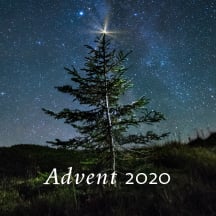 On this Second Sunday of Advent, the Prophet Isaiah declares, “A voice cries out: In the desert prepare the way of the LORD!” (Isaiah 43:1). In Hebrew, the word for “desert” is the masculine noun midbar, a word that refers to tracts of land used for the pasturage of flocks and herds; it can also simply refer to land that is uninhabited. In Isaiah, the prophet tells us that God will come to his people from the midbar; thus the prophet urges his people to “Make straight in the wasteland a highway for our God!” (Isaiah 43:1). In the Hebrew Bible, the Lord often makes himself known in the wilderness. Hagar meets God in the midbar of Beersheba after Sarah convinces Abraham to expel her. The Israelites travel through the midbar in the Book of Exodus. In their wilderness wanderings, the Jewish people follow God as a cloud by day and as a pillar of flame by night.
On this Second Sunday of Advent, the Prophet Isaiah declares, “A voice cries out: In the desert prepare the way of the LORD!” (Isaiah 43:1). In Hebrew, the word for “desert” is the masculine noun midbar, a word that refers to tracts of land used for the pasturage of flocks and herds; it can also simply refer to land that is uninhabited. In Isaiah, the prophet tells us that God will come to his people from the midbar; thus the prophet urges his people to “Make straight in the wasteland a highway for our God!” (Isaiah 43:1). In the Hebrew Bible, the Lord often makes himself known in the wilderness. Hagar meets God in the midbar of Beersheba after Sarah convinces Abraham to expel her. The Israelites travel through the midbar in the Book of Exodus. In their wilderness wanderings, the Jewish people follow God as a cloud by day and as a pillar of flame by night.
The writers of Mark’s Gospel begin their record of the life of Jesus Christ with Isaiah’s declaration of the Lord’s coming: “As it is written in Isaiah the prophet: Behold, I am sending my messenger ahead of you; he will prepare your way. A voice of one crying out in the desert: ‘Prepare the way of the Lord, make straight his paths’”(Mark 1:1-3). In the Greek, the word for “desert” is erémos, which, like midbar, refers to uncultivated, unpopulated land, or more figuratively, a barren solitary place that provides freedom from disturbance. Jesus goes to the erémos to be tempted during his forty-day period of fasting. He also goes to the erémos to be with his Father in prayer. This figurative understanding of the wilderness, as a quiet place away from the hustle and bustle of the world, has particular resonance in our current historical moment. This Christmas will be quieter for most given the resurgence of COVID-19 around the country. Parties and dinners will be smaller; perhaps there will be less gifts under the tree due to financial pressures. Attendance at Masses and vigils will be low, and many more will find themselves on the streets without homes. There will be a general sense of less this winter. The Advent and Christmas seasons will be more like the wilderness.
Yet, both the Hebrew Bible and the New Testament remind us that God finds us in the desert. This Advent, may we prepare to meet the one who came not with loud trumpets but in quiet. A God who meets us in the midbar because it is in “wilderness times” that we remember our fragility as creatures. When we find ourselves without the safeguards, conveniences and ease of a world that is running as usual (a “usual” that has always meant comfort for some and hardship for others), we remember that we need God: not God as idea or feeling, but the living God who meets us in the lost places of our lives. During this Advent season, let us be with Hagar, John the Baptist and the wandering Israelites in the erémos of our current historical moment to meet the God who loves us.
“midbar.” https://biblehub.com/hebrew/4057.htm
“erémos.” https://biblehub.com/greek/2048.htm



